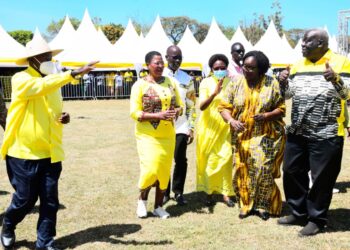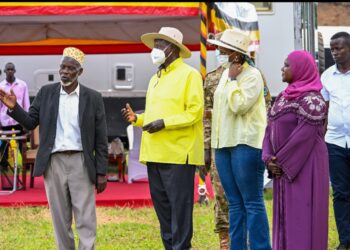Jinja City Education Officer in Jinja has made a passionate appeal to the government through the ministry of Education and Sports to reinstate the Grade III Teachers’ Certificate (TRS) course.
Paul Baliraine Mugaju argues that the abrupt discontinuation of this program is detrimental to the future of primary education in Uganda.
“…whoever made the decision to abruptly stop the Grade III teachers’ course is an enemy to the education of this country, we need it in our primary schools otherwise we are burying primary education…”, he appeals.
He says the current core PTCs can still train grade III teachers arguing that, after all the tutors are redundant with no workload.
Baliraine regrets that it’s a matter of time when Uganda’s education ministry will once again go back to seek the services of untrained licensed teachers as was the case in the 198os and early 1990s when either senior six leavers and non-teacher graduates were enlisted to teach because of shortage of trained teachers.
The seasoned educationist made a passionate plea, highlighting the pivotal role Grade III teachers play in laying the foundation for a child’s educational journey, and cautioning that their absence would severely compromise the quality of primary education.
Baliraine says primary education is the cornerstone of any country’s educational system because it lays the foundation for future academic success and plays a crucial role in shaping a child’s cognitive, social, and emotional development.
The quality of primary education directly impacts a student’s ability to progress to higher levels of education and ultimately contribute to the nation’s development.
In Uganda, primary education is especially vital, as it is during these early years that children develop essential skills in literacy, numeracy, and critical thinking.
Grade III teachers are instrumental in delivering quality primary education. These educators are specifically trained to handle the unique needs of young learners, providing them with the support and guidance necessary for their growth and development.
Grade III teachers are not only responsible for imparting knowledge but also for nurturing the social and emotional well-being of their students. Their role is crucial in building a strong educational foundation, which is essential for the success of students in later years.
The discontinuation of the Grade III TRS course has led to a shortage of qualified primary school teachers, which is having a ripple effect on the quality of education.
With fewer trained teachers available, schools are struggling to maintain standards, and the number of qualified educators is dwindling.
This shortage is particularly concerning given the importance of primary education in shaping the future of Uganda’s youth.
Paul Baliraine Mugaju’s call to reinstate the Grade III TRS course is being seen as timely and necessary with experts saying revival of this program will enable the government to ensure that primary schools are staffed with qualified and trained educators who can provide the high-quality education that young learners deserve.
“…the current Core Primary Teachers’ Colleges (PTCs) have the capacity to train Grade III teachers, and utilizing these institutions would be a practical solution to the shortage…”, he stresses.
The appeal also highlights the challenges in attracting new teachers to the profession.
The city education chief says with meager pay and a negative societal attitude towards primary school teachers, few Advanced Level students are willing to pursue a career in primary education.
This trend, he says is alarming and underscores the need for urgent action to address the shortage of qualified teachers.
“…few Advanced level students are ready and willing to join colleges to study primary education due to the meagre pay and societal attitude towards primary school teachers…”, he laments.
Pessimists now say the future of primary education in Uganda hangs in the balance, and the reinstatement of the Grade III TRS course is crucial to ensuring that young learners receive the quality education they deserve.
This means the government must take immediate action to address this issue and provide the necessary support to primary schools, so that Uganda can build a strong foundation for its education system, ultimately contributing to the country’s development and prosperity.
The phasing out of PTCs in Uganda began in 2023 with the government announcing plans to maintain only 23 core PTCs and repurpose the remaining 22 non-core institutions.
The decision was meant to upgrade teacher qualifications with a focus on degree-awarding institutions.
The phased-out colleges were to be converted into various institutions as secondary schools, university campuses, health training institutions, TVET skills training institutions and instructor training institutions.
According to experts, primary education lays the foundation for a child’s future academic success and plays a crucial role in shaping their cognitive, social and emotional development.
It contributes to a child’s future and country in a number of ways like helping children develop essential skills in literacy, numeracy and critical thinking.
A strong primary education foundation sets the stage for future academic achievement and opportunities.
Primary education also helps children develop social and emotional skills such as communication, teamwork and problem-solving. Experts say a well-educated population is essential for a country’s economic growth and development.
As can be recalled, a recent debate over the disparity in minimum qualifications between MPs and educators continue to generate debates.
While nursery and primary school teachers will be expected to hold a minimum of a bachelors degree with headteachers requiring a master’s degree, MPs need only a minimum formal education of senior six or UACE commonly referred to as Advanced Level(A-Level).
This discrepancy has raised questions about the qualifications of lawmakers who are tasked with scrutinizing and internalizing critical issues like budget passing and appropriation.
Some MPs like Hon Sarah Opendi had proposed increasing the minimum academic requirements for MPs to a degree citing the need for more knowledgeable and articulate leaders.
The Tororo District Woman MP argued that the current requirement which dates back to the 1995 constitution is outdated and no longer reflects Uganda’s evolving educational landscape.
With many citizens now having access to higher education, Hon Opendi believes that it is essential for MPs to possess the necessary skills and knowledge to effectively represent their constituents.
However, President Yoweri Museveni poured cold water on the argument saying it can lead to elected leaders prioritizing their own interests over those of their own people.
Do you have a story in your community or an opinion to share with us: Email us at editorial@watchdoguganda.com














